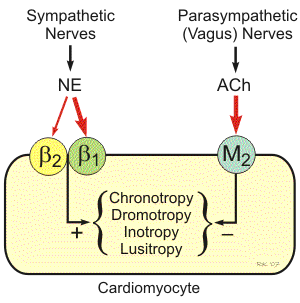I am reading this and this where I am considering this sentence
[N]o baseline parasympathetic innervation [in transplanted heart].
Does this sentence imply that the heart work then in full sympaticus all the time? Probably, through altered systems, but still. At least the regulation of blood pressure strongly supports this, here for the generic medication plan.
Does transplanted heart have full sympaticus without medication?
Notification of terminology. I tend to use overloading in writing. For instance, I can say that there is sympathetic and parasympathetic supply to the heart i.e. innervations of S and PS through endocrine system to the heart.
I am not yet completely sure how the recipient's body can target the alpha and beta receptors of donors in heart. Are there any variations of these receptors? If yes, then the effect of sympathetic stimulation would also differ from the original stimulation. So full sympaticus (or original) may not be present. The new stimulation may lead to greater or smaller activation of sympaticus.

